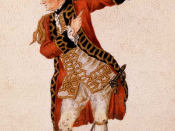"Much Ado About Nothing" is a highly successful play, and one of the reasons for this is because of the way in which the themes are explored and presented by Shakespeare. As well as its light-hearted elements, such as the comical exchanges in the "merry war" between two central characters Beatrice and Benedick, and the highly varied exploration of the values, tests and rewards of love, there are also the more contemplative areas, such as the examination of deception, misconception, and pride.
Pride has several definitions, each of which Shakespeare has approached and demonstrated, and this he has done particularly through several of the main characters. For example, Don John is portrayed as having an excessively high opinion of his self. The first reference made to him in Act 1 Scene 1 is when Leonato invites him to stay with the rest of the returned war party, saying
"Let me bid you welcome, my lord, being reconciled to the Prince your brother."
This immediately indicates to the audience that there is a colourful history between the two Dons, which although is only implied, has involved a tension in their relationship caused by Don John. The inferred consequence - that Don John remains inwardly humiliated - can be seen through the way in which Don John replies,
"I thank you: I am not of many words, but I thank you."
In a different context this could be interpreted as a genuine gesture of gratitude, yet later on, as the portrayal of Don John is developed further, it is suggested more heavily that Don John despises his brother and the company he keeps. He declares:
"I had rather be a canker in a hedge than a rose in his grace."
The audience can infer from this that Don John's earlier statement of...


